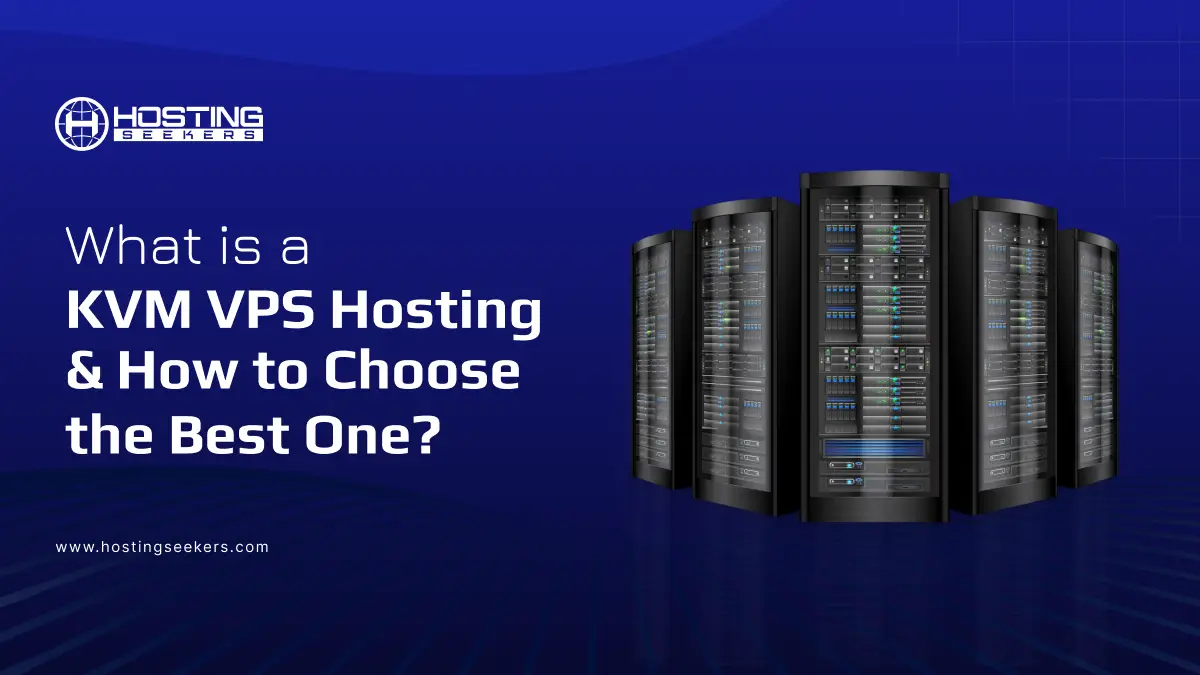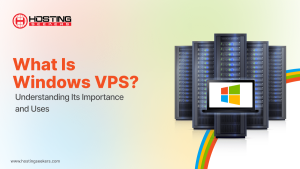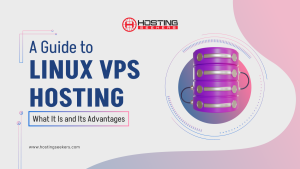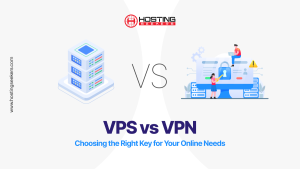
What is KVM VPS Hosting? A Detailed Guide
VPS Updated on : July 14, 2025KVM (Kernel-based Virtual Machine) has emerged as one of the most popular choices for Virtual Private Servers (VPS) in recent years. As KVM is built directly into the Linux kernel, it acts as a powerful hypervisor that allows multiple operating systems to run independently on the same physical hardware. Each KVM VPS operates like a dedicated server, offering its own disk space, RAM, CPU, kernel, and network resources.
In this blog, we’ll explore what KVM VPS hosting is, its key benefits, available plans, and how to choose the best one for your needs.
What is a KVM VPS?
A KVM VPS (Kernel-based Virtual Machine) Virtual Private Server is a type of VPS that uses KVM virtualization technology to create fully isolated virtual environments on a physical server. KVM turns the host machine into a hypervisor, enabling it to run multiple virtual servers, each with its own operating system and dedicated resources.
This isolation ensures that each VPS performs independently, offering a reliable and secure hosting solution. Whether you’re managing a high-traffic website, deploying custom applications, or running development environments, a KVM VPS provides the flexibility and power you need. With self-managed KVM VPS plans, you even get full root access and the freedom to install the operating system of your choice.
How does KVM VPS Hosting work?
KVM is among the most effective and secure virtualization technologies developed into the Linux Kernel. A hosting provider starts by setting up a robust, high-performance physical server equipped with enterprise-grade hardware designed to handle heavy workloads.
To increase efficiency and resource allocation. Kernel-based Virtual Machine (KVM) virtualization is installed on this server. Additionally, KVM is a complete virtualization solution built into the Linux Kernel, enabling the physical server to be partitioned into different, fully isolated Virtual Private Servers (VPSs).
Moreover, each VPS functions like an independent server environment. As a KVM provider for full virtualization, users can easily load their kernels, making it the ideal solution for advanced users, developers, and special workloads.
Who can utilize KVM VPS Hosting?
KVM VPS Hosting can be utilized for all types of websites. It can be beneficial for small businesses that want to enhance their operations. Additionally, large companies that handle sensitive data can utilize KVM VPS hosting for improved security and data protection.
KVM VPS hosting can also be used for hosting data, games, and VPS servers. It can also be used for other source-intensive projects, including FOREX trading, eCommerce platforms, research institutions, and more.
Why Choose KVM VPS Hosting?
1. Full Virtualization
KVM comes with an isolated environment and hardware-level virtualization that allows users to operate and install complete operating systems, including custom kernels, just like physical servers. Each KVM includes an independent kernel that allows you to utilize various OS like Linux, BSD, Windows, and more.
2. Extended Security.
As each kernel runs in its isolated environment, that helps prevent one VM from impacting others. The isolation between virtual machines ensures robust security and is supported by security features such as SELinux and access control, which are built into the Linux kernel.
3. Reliable Performance
Effective integration with the Linux Kernel ensures robust performance. It enables direct access to host hardware resources, resulting in decreased downtime. This ensures you run the application efficiently on the computer. Therefore, the guaranteed allocated resources ensure more consistency in speed and reliability.
4. Easier to Manage
KVM VPS hosting comes with easy-to-manage functionality. Users can easily create KVM servers using the computer hardware that they already have. Moreover, users can easily migrate and clone virtual machines, which makes the process quicker and more seamless.
KVM VPS vs Other Virtualization Technologies
Another popular virtualization technology available in the market is OpenVZ, Xen, and VMware.
1. OpenVZ
Also stated as Open Virtuozzo, a Linux system containerization software that allows one to operate a Linux-based operating system on a single host system under a shared kernel. With root-level access and isolation, containers function as independent Linux systems. It is considered easy to get started and also seamless to configure.
KVM vs OpenVZ
| Feature | KVM | OpenVZ |
| Virtualization Type | It uses full virtualization at the hardware level. | It uses container-based virtualization, |
| Kernel Management | With KVM, each VPS operates its isolated kernel | It uses a shared kernel across all containers. |
| Operating System Support | It supports a wide range of operating systems, including Linux, Windows, BSD, and more | It is limited to Linux-only environments. |
| Isolation Type | It offers robust isolation between virtual machines. | It provides limited isolation. |
2. Xen
Xen is an open-source virtualization tool that was started as a research project at the University of Cambridge. It is a cross-platform hypervisor, a program, or a hardware system that enables different operating systems to operate seamlessly. It can be installed on most Linux operating systems, including Ubuntu, Debian, RHEL, OpenSUSE, CentOS, and others.
KVM vs Xen
| Feature | KVM | Xen |
| Performance | It delivers near-native performance. | It also offers high performance but needs a more complex configuration. |
| Ease of Use | It is considered easier to manage and set up. | It is more complex. |
| Hypervisor Type | It operates as a Type-1 hypervisor through the Linux kernel. | Indeed, a Type-1 hypervisor runs directly on the hardware. |
| OS support | It comes with robust backing, including Linux, Windows, and more | It also provides robust support primarily for Linux OS systems. |
| Use Case | It is ideal for general-purpose virtualization. | It is ideal for enterprise and large-scale cloud deployments. |
3. VMware
VMware ESXi is a true bare-metal Type-1 hypervisor that operates directly on physical hardware, without requiring an underlying operating system, offering robust isolation and performance. It includes advanced enterprise features built in, including high availability (HA), Distributed Resource Scheduler (DRS), and enhanced performance monitoring.
KVM vs VMware
| Feature | KVM | VMware |
| Hypervisor Type | It operates as a Type-1 hypervisor through the Linux Kernel. | It is true bare metal. |
| Management Tools | It supports a variety of open-source management tools like libvirt, virt-manager, and ovirt. | It is managed through the vSphere client and vCenter Server. |
| Enterprise Features | Enterprise features are available through third-party tools. | It comes with advanced enterprise features. |
| License | It is free and open source. | It is a paid, proprietary hypervisor that requires a license for full access to its features. |
When to Choose KVM VPS Hosting?
Choose KVM VPS Hosting If;
- You need consistent performance and dedicated CPU, RAM, and Storage resources that aren’t shared with other users.
- You want to have complete control over installing the OS and customization options.
- Your website and applications demand an isolated environment.
- You want flexibility to scale up your resources.
- You need better speed and responsiveness than shared hosting.
Avoid KVM VPS Hosting If;
- Avoid KVM VPS Hosting if you have a limited budget.
- Your website has minimal traffic.
- If you are using it for short-term or temporary goals.
- It needs technical expertise, and configuration can be time-consuming for beginners.
How to Select the Best KVM VPS Hosting?
Once you have decided to select KVM VPS hosting, here’s the checklist that you need to choose.
1. Performance
The performance of your website matters. Therefore, consider a provider that guarantees a sufficient number of CPU cores, SSD storage, and adequate RAM. Moreover, also check the hardware virtualization with VT-x and AMD-V support. These features enable virtual machines to run more efficiently by offloading specific processes to the hardware level, resulting in improved isolation, enhanced performance, and faster execution of workloads.
2. Speed and Reliability
Low latency can hinder a website’s business, and there is a high chance that users may exit the website if it fails to load quickly. Therefore, before opting for the KVM VPS provider, check the speed and reliability that the provider offers. You can consider checking reviews of potential clients.
3. Data Centers
Looking for the data center location of the provider is another crucial factor. Check the locations of the data center. Select the one that is situated near your location. This can improve your business performance with minimal downtime.
4. Support
Most of the providers promise a 99% uptime guarantee with 24/7 support. Therefore, check the reviews of other users before trusting the provider. Additionally, you can verify SLA (Service Level Agreement)-backed uptime, which ensures that a service will be available as promised by the service provider.
Top KVM VPS Hosting Providers
1. Kamatera
Pricing: Starting at $4/ month
Kamatera is among the top KVM VPS hosting providers, offering a range of VPS options and a multitude of features, including robust server setup, scalability, cloud-powered servers, and competitive pricing. Additionally, it features a simple management console and API, providing flexibility in software installation and configuration.
2. Hostinger
Pricing: Starting at $4.6/month
Hostinger offers various KVM-based plans with multiple configurations to meet different requirements and budgets. Its features include NVMe SSD storage, global data centers, full virtualization, and customization options, which are not available in container-based solutions. Additionally, it offers several KVM VPS plans, including KVM1, KVM2, KVM4, and KVM8, each with a different number of CPU cores.
3. Webdock
Pricing: Starting at $1.26/month
Webdock offers KVM Virtual Machines as its VPS virtualization option. It comes with premium, enterprise-grade hardware, including Intel Xeon or AMD EPYC CPUs and high-speed NVMe SSDs. Its control panel makes VPS management more user-friendly.
Its cost-effective solutions serve businesses, developers, and tech enthusiasts who seek top-notch performance with complete control, ensuring stable uptime and efficient resource management.
4. Ultahost
Pricing: Starting at $5.99/monthly
Ultahost is another KVM VPS hosting provider that ensures maximized efficiency for websites and applications. It comes with robust features, including multiple CPU cores, DDR5 RAM, up to 100 GB of NVMe SSD storage, eight dedicated IPv6 addresses, and unlimited bandwidth. Moreover, its basic plan includes a 30-day money-back guarantee. Furthermore, it offers pricing options with various control panels, including cPanel and Plesk, as well as other panels, such as CyberPanel and Hestia.
5. MVPS
Pricing: Starting at $4.68/monthly
MVPS offers robust performance and stability by providing an economical VPS server based on full KVM virtualization. Features include CPU cores, RAM, Disk space, and bandwidth up to 50 TB. Its support is responsive and mostly suited for fundamental errors, allowing users to manage advanced configurations independently.
Summing Up
That was a detailed guide on KVM VPS hosting. If you need complete control and isolation with consistent performance, opting for KVM VPS hosting can be the best solution for you. It’s best suited for businesses running high-traffic websites, custom applications, or requiring enhanced security and scalability. Moreover, if you are looking for long-term performance and control, a KVM VPS can be a wise investment.
Frequently Asked Questions
Q 1. Is KVM VPS better than Shared Hosting?
Ans. KVM comes with robust features, security, and dedicated resources, making it an ideal choice for businesses compared to shared hosting.
Q 2. How is KVM VPS different from other VPS types?
Ans. KVM provides true virtualization, meaning each VPS runs as a standalone server with its kernel and complete isolation from others. In contrast, other technologies, such as OpenVZ, offer container-based virtualization, which shares the host kernel.
Q 3. Can I install any operating system on a KVM VPS?
Ans. Absolutely. KVM supports a wide range of operating systems, including Linux distributions (such as Ubuntu, CentOS, and Debian), as well as Windows, since each VPS operates with its kernel.
Q 4. Is KVM VPS suitable for beginners?
Ans. While KVM VPS offers power and flexibility, it may not be ideal for beginners due to the technical expertise required for setting up, maintaining, and securing the server. Managed KVM VPS plans can be a good alternative for non-technical users.




